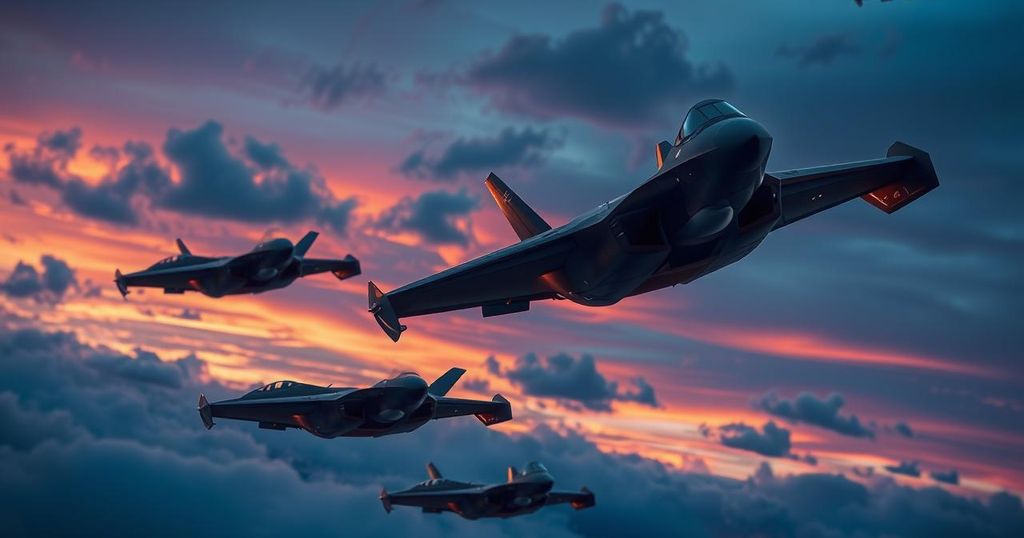Israel may require US support, particularly stealth bombers, to target Iran’s underground nuclear sites effectively. The operation demands heavy bombardment and operational coordination due to Iran’s upgraded defenses. Diplomatic avenues versus military strategies continue to shape their approach amid escalating tensions.
In the event that Israel intends to neutralize Iran’s underground nuclear facilities, substantial support from the United States would be crucial. Accomplishing such a mission would necessitate extensive airstrikes, including the use of heavy bunker-busting bombs and cruise missiles, which would likely strain both nations’ military capabilities if deployed under limited time constraints.
Iran possesses the capability to enrich sufficient uranium to develop a nuclear weapon within a matter of weeks. The two primary strategies to impede Iran’s nuclear ambitions are through effective diplomatic negotiations, similar to the nuclear deal that President Donald Trump exited in 2018, or through potent military action. In a recent interview, Trump stated, “There are two ways Iran can be handled, militarily or you can make a deal. I would prefer to make a deal.” He underscored the urgency of addressing the situation with Iran, suggesting a significant event is imminent.
While Israel may consider pre-emptive strikes with the objective of dismantling Iranian facilities, consulting US airpower would be vital for a successful operation. Military analysts opine that a coordinated attack would require sustained assaults utilizing advanced stand-off munitions such as cruise missiles. The Northrop B-2 Spirit stealth bomber, which is uniquely capable of deploying the GBU-57 Massive Ordnance Penetrator, is deemed indispensable for penetrating Iran’s fortified sites.
Ryan Bohl from RANE noted, “It would be a major milestone in the history of warfare should we see a joint Israeli-US strike on Iran.” Such an operation could yield significant insights regarding the efficacy of American military technologies against comparable systems employed by nations such as Russia and China. Concurrently, the United Nations Security Council convened to discuss Iran’s aggressive uranium enrichment, with the US accusing Iran of blatant defiance.
In conjunction with diplomatic efforts, recent drills featuring US Air Force B-52 bombers alongside Israeli F-35 jets signal a growing military readiness. The primary targets of any prospective strikes would include the Natanz and Fordow facilities, both designed to withstand aerial bombardment due to their fortified construction.
A comprehensive military campaign would require addressing various elements of Iran’s defense infrastructure, including their air defenses and missile capabilities through airstrikes, cyber warfare, and possibly special operations. Further strikes, particularly with American involvement, could cause substantial effectiveness against Iran’s previous defensive arrangements. Bohl remarked that Iran is currently “on the back foot defending its airspace.”
Despite the air superiority of the US and Israeli forces, there are inherent limitations to the extent of what can be achieved in a short campaign. Should a military strategy fail to undermine Iran’s military capacity comprehensively, Iranian retaliation could ensue, particularly utilizing their substantial arsenal of regional ballistic missiles. Iran’s preparations over the decades suggest resilience even in the face of aerial attacks, as critical infrastructure may remain intact.
The potential for an unprecedented joint military assault on Iran exists, with Heras from the New Lines Institute stating, “Without a doubt, a joint US-Israel military campaign against Iran’s nuclear program would be one of the largest, and certainly the most technologically advanced, in human history.”
The necessity of US stealth bombers and military coordination underscores Israel’s challenging position regarding Iran’s nuclear capabilities. The strategy to address these capabilities could either pivot toward diplomatic negotiations or execute extensive military action, necessitating comprehensive planning and resources. The complexities of military escalation and potential retaliation from Iran further complicate the situation. Ultimately, if such an attack were to occur, it would mark a significant historical moment in military operations.
Original Source: www.businessinsider.com






